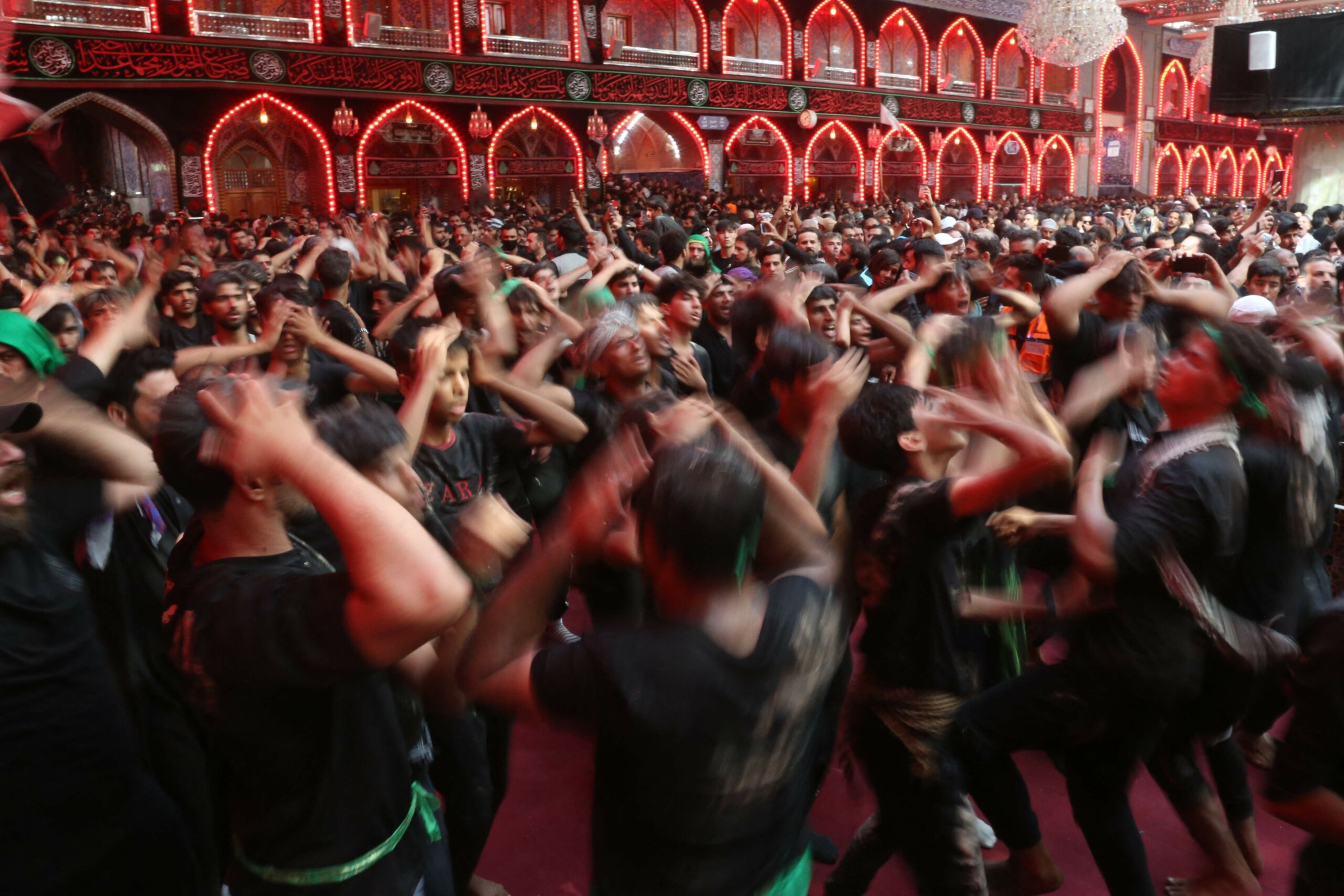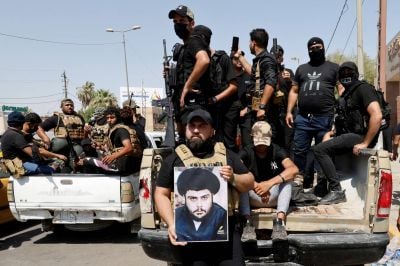“It’s as if I had just arrived in paradise,” says Najmè, an Iranian teacher, wrapped in a black chador, who came to the holy city of Kerbala in Iraq like three million of her compatriots for the Arbain pilgrimage. , the highlight of the Shiite calendar.
“I am extremely happy,” adds the 37-year-old woman. With her parents and her husband, she says she left by car from Qom in Iran to go to Najaf, another holy Shiite city in Iraq. His family then walked 80 kilometers to Karbala in central Iraq, where this year Persian is spoken as much as Arabic. His mother, Latifé, does not hide her joy either: “I regularly call the family in Iran, I send them photos and videos to share with them the atmosphere” of this pilgrimage.
Shia Muslim pilgrims gathered in Karbala to celebrate the Arbain festival, in Iraq, on September 17, 2022. Photo Mohammed SAWAF / AFP
The Arbain (“Forty”, in Arabic) is one of the largest religious gatherings in the world. Shiite Muslims, the majority in Iraq and Iran, mark the fortieth day of mourning for the martyrdom of Imam Hussein, grandson of the Prophet Muhammad and founding figure of Shiism. After two years of the coronavirus pandemic marked by restrictions, 20 million Shiites were able to join Karbala this year, where Imam Hussein and his brother Abbas are buried. And the Iranian pilgrims flocked thanks to the abolition of visas.
The massive arrival of pilgrims has caused the prices of hotels to soar, all of which are fully booked. For lack of beds, some sleep on sidewalks, lying on blankets. On the esplanade linking the mausoleums of Hussein and Abbas, in the alleys winding around the two sparkling blue and gold ceramic mosques, the faithful move forward under an oppressive heat.
Processions and tears
At night, in the electric atmosphere of neon lights, there are processions. The men dressed in black dance, jumping in place, hitting their chests, to the rhythm of religious songs spit out by loudspeakers. Men weep hot tears, others beat their faces, remembering how the imam was killed in 680 by the troops of the Umayyad caliph Yazid in the desert of Karbala.
“The Arbain for Iranians of the working classes is a travel opportunity. It is a religious and social event”, summarizes Alex Shams, doctoral student at the University of Chicago, specialist in political Shiism in Iraq and Iran. . “Iraq is one of the few countries where they can go and where they will be well received,” he added.
Prior to 2003 and the overthrow of Saddam Hussein in the US-led invasion, Iraq’s Shiite majority was not allowed to openly commemorate the event. The faithful who did not exercise discretion risked imprisonment. For the Islamic Republic in Iran, which encourages participation in the pilgrimage, this event is also important because it is “a way of strengthening its presence and making itself visible in the Shiite world”, explains Alex Shams.
Among the 20 million pilgrims (17 million last year), five million foreign visitors have been identified, according to figures provided by Baghdad. In addition to Iranians, Lebanese and Pakistanis flock every year. In Iraq too, the Arbain spills over into politics. The two poles that dominate the political scene are Shiites: the Coordination Framework, close to Tehran, and the Current of the religious Moqtada Sadr, whose relations with Iran are on the upswing.
“Big family”
Moqtada Sadr called on his supporters not to brandish any political sign during the pilgrimage. Just as he forbade attacking foreign pilgrims “especially Iranians” whom he invited to respect Iraqi laws. The Embassy of the Islamic Republic has called on its nationals not to stay in Karbala beyond the pilgrimage. Ali Takalo, a retired Iranian teacher, is making his seventh pilgrimage.
“I have the impression of finding my big family”, is moved by the sexagenarian. He admits having had some “fears” before coming because of the security situation. “But the situation is very good. What the press says is all lies,” he asserts. Iraq still does not have a new Prime Minister, the barons of political Shiism failing to agree. The crisis degenerated into fighting in late August in Baghdad, when supporters of Moqtada Sadr clashed with the army and men of Hachd al-Chaabi, former paramilitaries integrated into regular troops. More than thirty followers of Sadr were killed.
“It’s as if I had just arrived in paradise,” says Najmè, an Iranian teacher, wrapped in a black chador, who came to the holy city of Kerbala in Iraq like three million of her compatriots for the Arbain pilgrimage. , a highlight of the Shiite calendar. “I am extremely happy,” adds the 37-year-old woman. With her parents and her husband, she says she is…
In Iraq, the Iranians return in force for the Arbain pilgrimage


